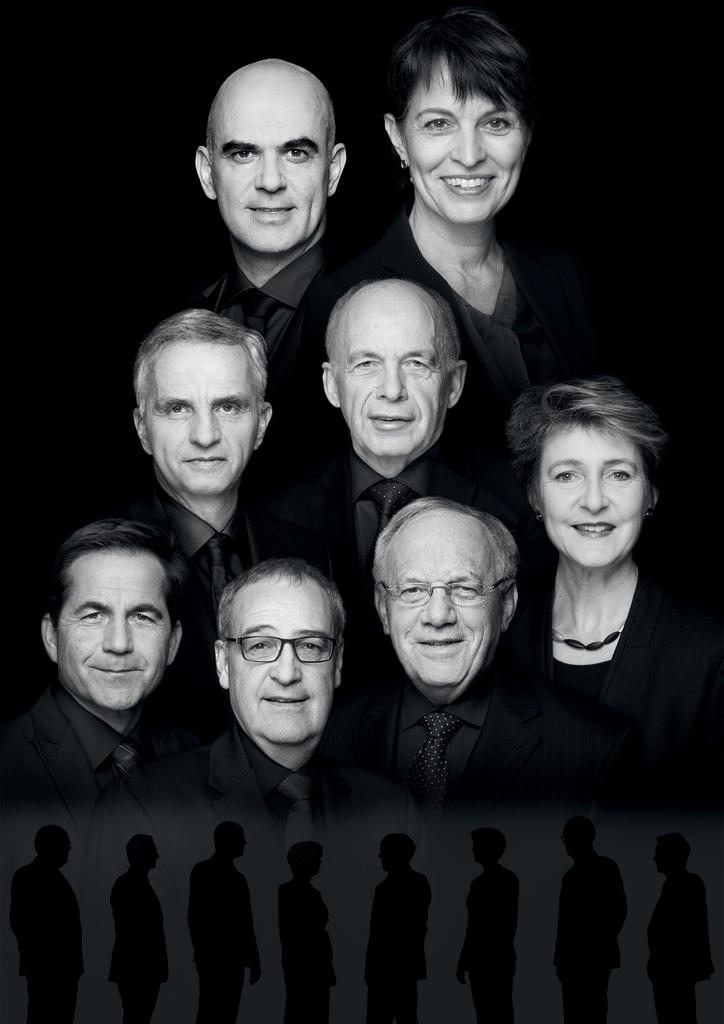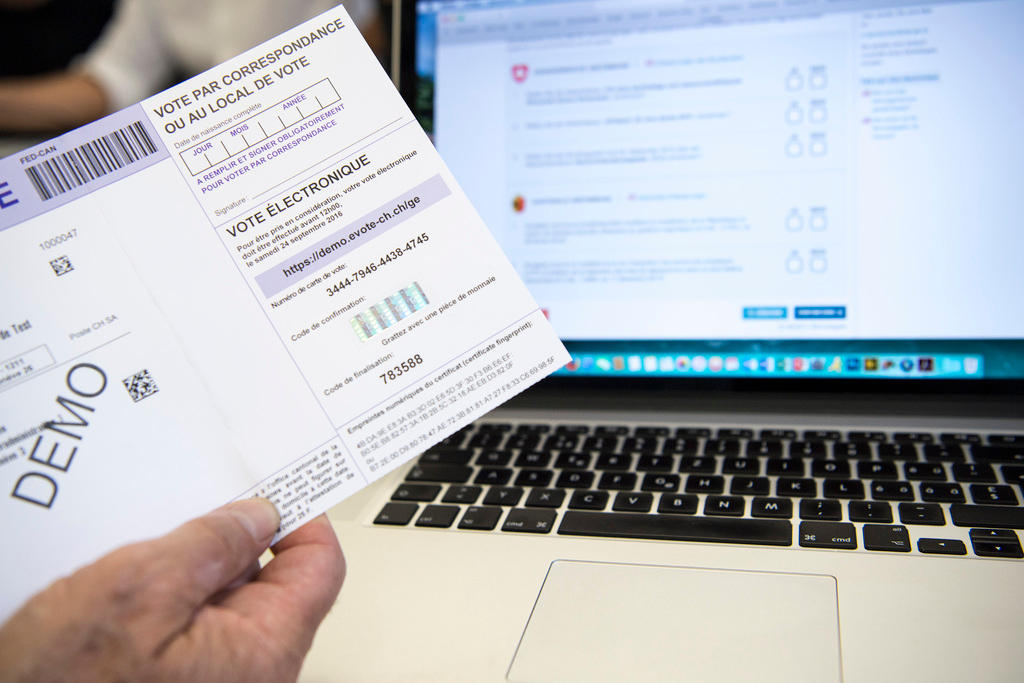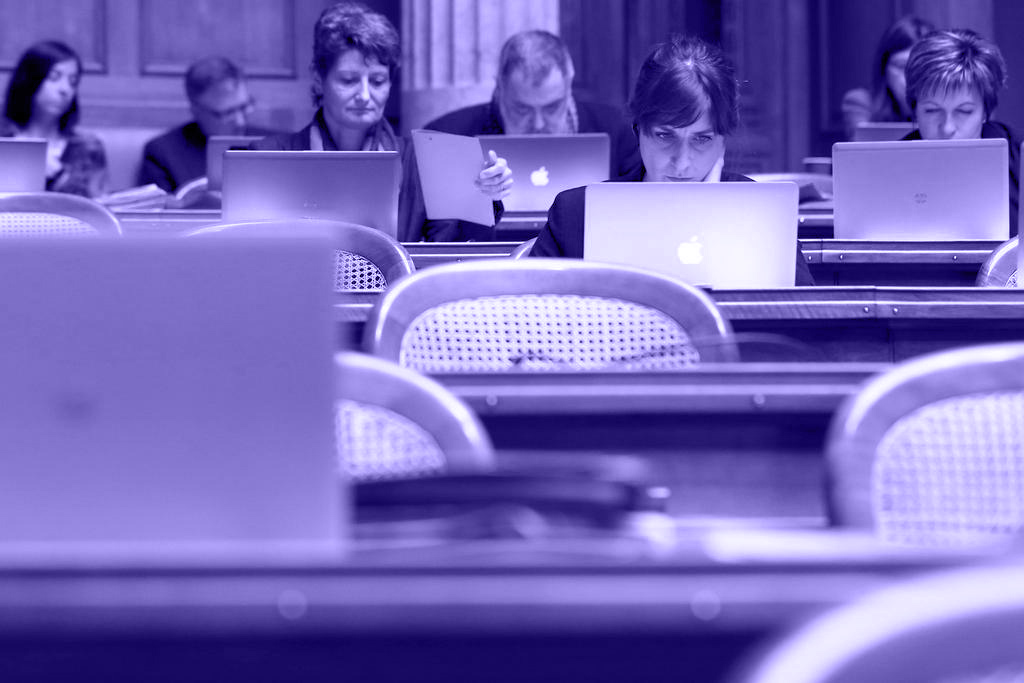Swiss democracy in stranglehold of digitalisation

Digital technology is the most important driving force behind politics today for Federal Chancellor Walter Thurnherr, but he is concerned about whether there will be enough time for crucial political processes in the Swiss system.
Thurnherr holds one of the most important offices in the finely balanced mechanism of Swiss democracy. Now 53, he is the chief of staff, supporting the cabinet in its governmental activity – but there’s another reason why Thurnherr and his Federal Chancellery are central: it’s that they act as an interface between the government, people, parliament and the federal administration.
swissinfo.ch talked to him on the sidelines of an event at the Aarau Centre for Democracy StudiesExternal link in March.
This text is part of #DearDemocracy, a platform on direct democracy issues, by swissinfo.ch.
“The motor car was invented in 1905, but it wasn’t until 1960, half a century later, that Switzerland had a national road network,” says Thurnherr.
“We don’t have that sort of time any longer. Our political processes are good, but they’re out of step with rapid international decision-making processes – and with technological developments, which are even faster. Finding accepted solutions capable of achieving majority support takes time.”
swissinfo.ch: You express disquiet over the advance of populist simplifications, for example in connection with the pre-Brexit campaign in Britain – but also in Russia, Turkey and the US presidential election. But for Switzerland you are optimistic, speaking of our locational advantages and pleading for more education. Are you talking about political education?
Walter Thurnherr: I’m not thinking primarily of teaching civics.
But we must be concerned about the values that only our democracy makes possible, such as the acceptance of the majority by the minority – but also the other way round, the consideration and protection of the minority by the majority.
Or that we find compromise more useful than obstinately sticking to our guns, something that’s much too often mistaken for strength.
I also think the critical-democratic reflex is important. Some issues are very complicated, and it’s advantageous if you’re in a position to ask: ‘Politicians, parties and organisations constantly try to sell us easy solutions, but are our problems really that simple? Isn’t there something else I should know?’

Citizens in a direct democracy bear a heavy responsibility. We need to put our brains in gear. That’s what I mean by education and training.
swissinfo.ch: In a 2016 study of authoritarian populism, a Swedish think tank ranked Switzerland in fifth position in Europe. What populist tendencies have you observed in Switzerland in the last 15 or 20 years?
W.T.: Generally speaking, wherever simple formulas are put forward as solutions for complex problems and challenges. And also when we stop thinking about something too soon.
That’s where the decline in media diversity becomes a factor, because diversity makes sure complex problems are looked at and discussed from different viewpoints.
It often happens that nobody knows exactly what the truth is, but the diversity of reporting gets us closer to it than a single press medium would: the thesis it’s presenting may be correct, but it may also be far too simple.
swissinfo.ch: Our media are going through rapid structural change. Traditional print media have become practically worthless, social media are becoming more and more dominant: they form what we might call echo chambers, in which users disseminate targeted fake news – making no attempt at concealment, and so far with total impunity. How are we to foster a press that reports objectively, unemotionally and in the interests of democratic debate and opinion forming?
W.T.: Fostering the press directly isn’t easy, because we don’t want the state to give the media direct financial support. That would create an unhealthy dependency.
One possibility that I incline towards is support for bodies like the Swiss News Agency [often referred to as SDA/ATS in German, French and Italian], the national press agency.

More
Swiss e-voting poised for expanded roll-out
It covers all the country’s regions and languages, and it has the capacity to produce large numbers of articles and reports that can be picked up by small newspapers.
swissinfo.ch: You see the massive acceleration in the procedures and processes of Switzerland’s political system as a major challenge. Last year the Federal Chancellery, which you head, published 46,000 pages of legislative texts, dispatches, reports and announcements. What will political operations in Switzerland’s democracy look like in five years’ time? Are we heading for the abyss?
W.T.: Probably not. Where political developments in Switzerland are concerned, our institutions are largely stable.
I won’t make any international forecasts, though. Look back five years: if you had correctly predicted the future then, who would have believed you?
As for technological developments, they are likely to continue to set the pace in the next five years – determining realities at high speed, and permeating our society through and through. As a rule, technology also leads to political decisions. It’s regulated or protected, fostered or forbidden.
swissinfo.ch: Where do you think the problems will lie?
W.T.: The problem arises when there’s hardly any time left for normal political processes. Take the creation of a new law, for example.
The federal administration draws up a draft proposal. This may have been preceded by a motion in parliament that was discussed and referred by the parliamentary chambers.
The cabinet decides on the draft, and it is then presented to all stakeholders: players, parties, associations, organisations. This consultation procedure takes several months. Then an analysis is prepared, a report drawn up, and a bill is sent to parliament.
Only then does the actual debate begin: first in the parliamentary committees, then in the two chambers. If the referendum option is selected, the matter is also put to the electorate.
It’s actually an excellent system, because everybody affected by the outcome is involved in the decision-making process and shares responsibility for it.
The question is whether we will be able to continue in future to find enough time to deal with all the international and technological developments.
We must keep our wits about us, and simply make the time.
Adapted from German

In compliance with the JTI standards
More: SWI swissinfo.ch certified by the Journalism Trust Initiative
















You can find an overview of ongoing debates with our journalists here . Please join us!
If you want to start a conversation about a topic raised in this article or want to report factual errors, email us at english@swissinfo.ch.